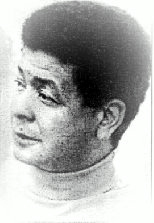Walter P. Carter
| Walter P. Carter | |
|---|---|
 |
|
| Born |
April 29, 1923 Monroe, North Carolina |
| Died | July 31, 1971 (aged 48) Baltimore, Maryland |
| Alma mater | North Carolina A&T |
| Organization | Congress of Racial Equality, Student Nonviolent Coordinating Committee, |
| Movement | Civil Rights Movement |
Walter Percival Carter (April 29, 1923 - July 31, 1971) was an activist and central figure in Baltimore, Maryland during the Civil Rights Movement by organizing demonstrations against discrimination throughout Maryland. A hospital, an elementary school, a recreation center, a college library and a day-care center in Baltimore are named for him.
Carter was the seventh of nine children born to Carrie P. and Walter Carter Sr. in Monroe, North Carolina. He received his bachelor's degree from North Carolina A&T, where he participated in voter registration, the debate team, and was a member of the Progressive Party. He was well liked by his classmates, and admired for his keen intellect and unusual sense of humor. Carter obtained a Master's Degree in Social Work (MSW) at Howard University. While studying at Howard, he met young Stokely Carmichael and the two became friends.
Carter led voter registration drives in the South, was a World War II veteran. As chairman of the local chapter of Congress of Racial Equality (CORE), he was an organizer massive and aggressive campaigns, including the 1960 Freedom Rides to the Eastern Shore of Maryland, Gwynn Oak Park, Howard Johnson Chain, and other eating establishments along Routes 40, 1, 150, and 50; apartment buildings, hotels, and other public accommodations throughout Maryland. Maryland coordinator of the March on Washington in 1963. He was a coordinator of the massive Federated Civil Rights Organization march, of more than 3,000, to protest segregation in housing in 1965.
In 1966, he and five other CORE members formed Activists for Fair Housing, later shortened to Activists, Inc. That year, the Apartment House Owners Association of Maryland was forced to open facilities to all. In the late 1960s, Carter convinced the Community Chest, now known as the United Way of Central Maryland, to fund grass roots organizations with African American constituents, such as Echo House. Carter protested segregated housing and poor living conditions that African Americans faced in Baltimore in the late 1950s and through the 1960s. He organized protest marches, often taking the fight to the homes of the whites who owned the segregated housing.
...
Wikipedia
